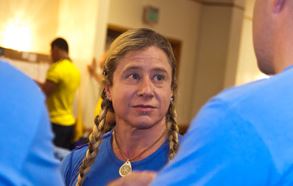Today I won’t share someone’s program. It doesn’t make sense anymore. He’s gone (as in deceased).
(originally published at elitefts – authored by me)
I was informed of his passing Monday, two days later. I still can’t explain my inner paradox: I had been engaging in mental rehearsals, “auto-biographical function” or just entertaining random trains of thought about my own projected future and he was consistently there, with consistently more central roles in the script. When I was informed of his passing, though, I could complete the sentence.
It’s been a day and a half of grieving. We kept in touch because I had been his coach. He then decided to quit our training while he focused on his academic life. He needed to invest his energy and money on that. I thought it was rational and let go.
That’s the beginning of the torturing “what ifs” that occupied my mind yesterday and also today. What if I didn’t let go? What if I had insisted on coaching him? How many people did I coach for free? I lost count. How many did I coach even when they had no goal – competitive or otherwise? Part of my job was elaborating a goal system with them.
You see, I became a coach long after I was a college professor. Decades later, I’d say. I’m an educator. A teacher. A teacher needs to have a set of skills to accomplish the most significant of jobs: to provide tools for the young to build their life projects. Their future.
So, of course, I’m now probably in the 36th hour of pondering what could I have done towards a different outcome. What tools did I fail to provide to him. The answer is simple: all of them. I was “just a coach” and then “just a friend”. An older friend, the “more experienced other” – the defining trait of the teacher – but still I didn’t (missing verb). There is something I didn’t (missing verb). The “missing verb” is not an editing mistake. I don’t know what the verb is. I am confused.
The “more experienced other” is in a young person’s life to facilitate learning, growing and healing. If we are not doing that, we are not being true teachers.
These are the questions:
- Is the “true” coach a teacher?
- Is the “true” coach a mentor?
- Is the “true” coach a friend?
- Is the “true” coach the “more experienced other”?
- Is the “true” coach a role model?
- Is the “true” coach a health service provider?
- Is the “true” coach a surrogate parent?
They bring along a string of other questions:
- What constitutes the ideal qualifications for being a coach?
- What educational program provides that?
- If #2 can be answered, what are the skills such program must provide (classes, internships, etc)?
- What constitutes the “calling” of a “true” coach?
I am taking a break from my “mission to civilize” and my radical criticism of what exercise and sports coaching has become.
These questions are the ones I am asking myself, obviously looking for answers that are not there. The questions are still relevant and I leave them here for your reflection.

